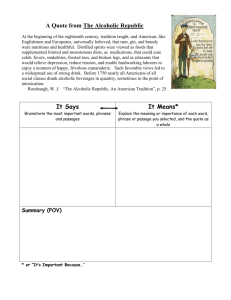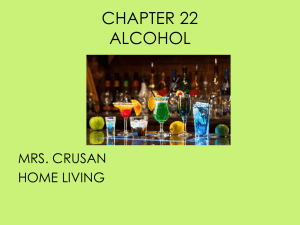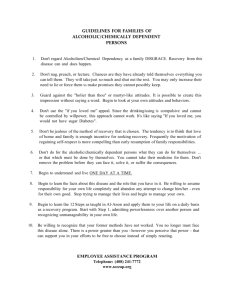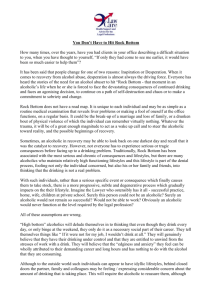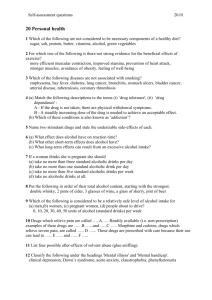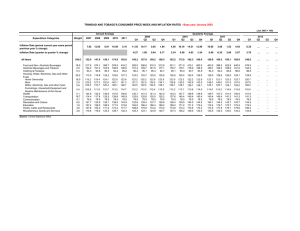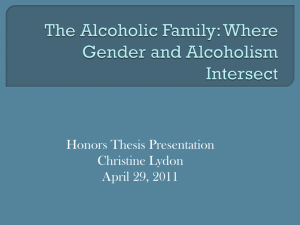Adult Child of an Alcoholic (ACoA)
advertisement
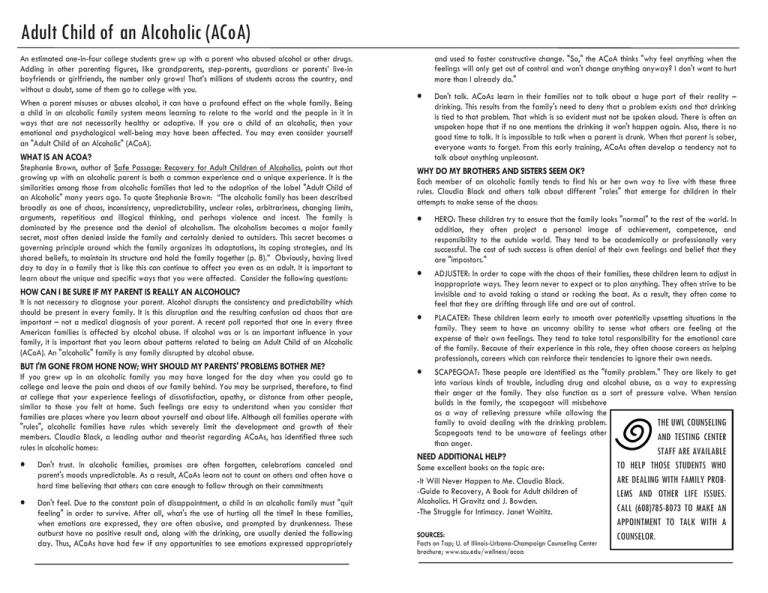
Adult Child of an Alcoholic (ACoA) An estimated one-in-four college students grew up with a parent who abused alcohol or other drugs. Adding in other parenting figures, like grandparents, step-parents, guardians or parents’ live-in boyfriends or girlfriends, the number only grows! That’s millions of students across the country, and without a doubt, some of them go to college with you. When a parent misuses or abuses alcohol, it can have a profound effect on the whole family. Being a child in an alcoholic family system means learning to relate to the world and the people in it in ways that are not necessarily healthy or adaptive. If you are a child of an alcoholic, then your emotional and psychological well-being may have been affected. You may even consider yourself an "Adult Child of an Alcoholic" (ACoA). and used to foster constructive change. "So," the ACoA thinks "why feel anything when the feelings will only get out of control and won't change anything anyway? I don't want to hurt more than I already do." • WHAT IS AN ACOA? Stephanie Brown, author of Safe Passage: Recovery for Adult Children of Alcoholics, points out that growing up with an alcoholic parent is both a common experience and a unique experience. It is the similarities among those from alcoholic families that led to the adoption of the label "Adult Child of an Alcoholic" many years ago. To quote Stephanie Brown: “The alcoholic family has been described broadly as one of chaos, inconsistency, unpredictability, unclear roles, arbitrariness, changing limits, arguments, repetitious and illogical thinking, and perhaps violence and incest. The family is dominated by the presence and the denial of alcoholism. The alcoholism becomes a major family secret, most often denied inside the family and certainly denied to outsiders. This secret becomes a governing principle around which the family organizes its adaptations, its coping strategies, and its shared beliefs, to maintain its structure and hold the family together (p. 8).” Obviously, having lived day to day in a family that is like this can continue to affect you even as an adult. It is important to learn about the unique and specific ways that you were affected. Consider the following questions: WHY DO MY BROTHERS AND SISTERS SEEM OK? Each member of an alcoholic family tends to find his or her own way to live with these three rules. Claudia Black and others talk about different "roles" that emerge for children in their attempts to make sense of the chaos: • HERO: These children try to ensure that the family looks "normal" to the rest of the world. In addition, they often project a personal image of achievement, competence, and responsibility to the outside world. They tend to be academically or professionally very successful. The cost of such success is often denial of their own feelings and belief that they are "impostors." • ADJUSTER: In order to cope with the chaos of their families, these children learn to adjust in inappropriate ways. They learn never to expect or to plan anything. They often strive to be invisible and to avoid taking a stand or rocking the boat. As a result, they often come to feel that they are drifting through life and are out of control. • PLACATER: These children learn early to smooth over potentially upsetting situations in the family. They seem to have an uncanny ability to sense what others are feeling at the expense of their own feelings. They tend to take total responsibility for the emotional care of the family. Because of their experience in this role, they often choose careers as helping professionals, careers which can reinforce their tendencies to ignore their own needs. • SCAPEGOAT: These people are identified as the "family problem." They are likely to get into various kinds of trouble, including drug and alcohol abuse, as a way to expressing their anger at the family. They also function as a sort of pressure valve. When tension builds in the family, the scapegoat will misbehave as a way of relieving pressure while allowing the family to avoid dealing with the drinking problem. THE UWL COUNSELING Scapegoats tend to be unaware of feelings other AND TESTING CENTER than anger. HOW CAN I BE SURE IF MY PARENT IS REALLY AN ALCOHOLIC? It is not necessary to diagnose your parent. Alcohol disrupts the consistency and predictability which should be present in every family. It is this disruption and the resulting confusion ad chaos that are important – not a medical diagnosis of your parent. A recent poll reported that one in every three American families is affected by alcohol abuse. If alcohol was or is an important influence in your family, it is important that you learn about patterns related to being an Adult Child of an Alcoholic (ACoA). An "alcoholic" family is any family disrupted by alcohol abuse. BUT I'M GONE FROM HONE NOW; WHY SHOULD MY PARENTS' PROBLEMS BOTHER ME? If you grew up in an alcoholic family you may have longed for the day when you could go to college and leave the pain and chaos of our family behind. You may be surprised, therefore, to find at college that your experience feelings of dissatisfaction, apathy, or distance from other people, similar to those you felt at home. Such feelings are easy to understand when you consider that families are places where you learn about yourself and about life. Although all families operate with "rules", alcoholic families have rules which severely limit the development and growth of their members. Claudia Black, a leading author and theorist regarding ACoAs, has identified three such rules in alcoholic homes: • Don't trust. In alcoholic families, promises are often forgotten, celebrations canceled and parent's moods unpredictable. As a result, ACoAs learn not to count on others and often have a hard time believing that others can care enough to follow through on their commitments • Don't feel. Due to the constant pain of disappointment, a child in an alcoholic family must "quit feeling" in order to survive. After all, what's the use of hurting all the time? In these families, when emotions are expressed, they are often abusive, and prompted by drunkenness. These outburst have no positive result and, along with the drinking, are usually denied the following day. Thus, ACoAs have had few if any opportunities to see emotions expressed appropriately Don't talk. ACoAs learn in their families not to talk about a huge part of their reality – drinking. This results from the family's need to deny that a problem exists and that drinking is tied to that problem. That which is so evident must not be spoken aloud. There is often an unspoken hope that if no one mentions the drinking it won't happen again. Also, there is no good time to talk. It is impossible to talk when a parent is drunk. When that parent is sober, everyone wants to forget. From this early training, ACoAs often develop a tendency not to talk about anything unpleasant. NEED ADDITIONAL HELP? Some excellent books on the topic are: -It Will Never Happen to Me. Claudia Black. -Guide to Recovery, A Book for Adult children of Alcoholics. H Gravitz and J. Bowden. -The Struggle for Intimacy. Janet Woititz. SOURCES: Facts on Tap; U. of Illinois-Urbana-Champaign Counseling Center brochure; www.scu.edu/wellness/acoa STAFF ARE AVAILABLE TO HELP THOSE STUDENTS WHO ARE DEALING WITH FAMILY PROBLEMS AND OTHER LIFE ISSUES. CALL (608)785-8073 TO MAKE AN APPOINTMENT TO TALK WITH A COUNSELOR.
